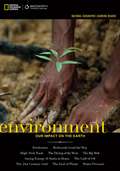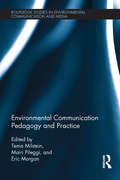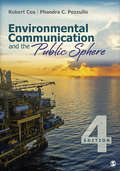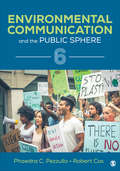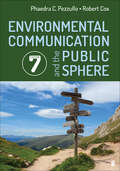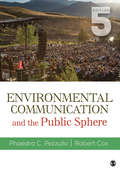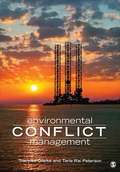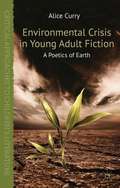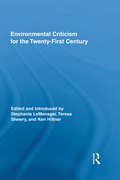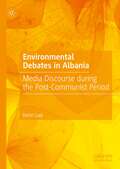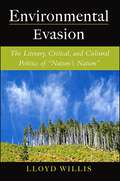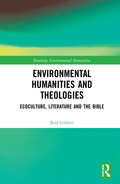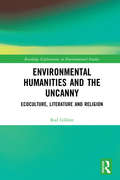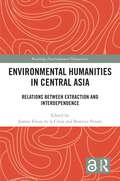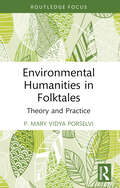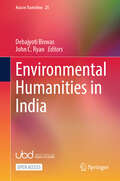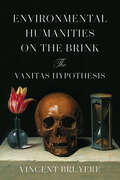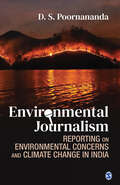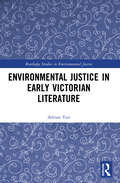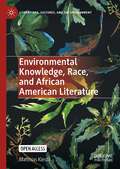- Table View
- List View
Environment: Our Impact on the Earth
by National Geographic LearningThis book covers many issues regarding the planet and humans' contributions to its environmental issues and discusses ways that humans are trying to preserve the planets resources and species, find new ways to recycle those resources, and help each other. .
Environmental Communication Pedagogy and Practice (Routledge Studies in Environmental Communication and Media)
by Tema Milstein Mairi Pileggi Eric L MorganGiven the urgency of environmental problems, how we communicate about our ecological relations is crucial. Environmental Communication Pedagogy and Practice is concerned with ways to help learners effectively navigate and consciously contribute to the communication shaping our environmental present and future. The book brings together international educators working from a variety of perspectives to engage both theory and application. Contributors address how pedagogy can stimulate ecological wakefulness, support diverse and praxis-based ways of learning, and nurture environmental change agents. Additionally, the volume responds to a practical need to increase teaching effectiveness of environmental communication across disciplines by offering a repertoire of useful learning activities and assignments. Altogether, it provides an impetus for reflection upon and enhancement of our own practice as environmental educators, practitioners, and students. Environmental Communication Pedagogy and Practice is an essential resource for those working in environmental communication, environmental and sustainability studies, environmental journalism, environmental planning and management, environmental sciences, media studies and cultural studies, as well as communication subfields such as rhetoric, conflict and mediation, and intercultural. The volume is also a valuable resource for environmental communication professionals working with communities and governmental and non-governmental environmental organisations.
Environmental Communication and the Public Sphere
by J. Robert Cox Dr Phaedra C. PezzulloThe Fourth Edition of Environmental Communication and the Public Sphere remains the only comprehensive introduction to the growing field of environmental communication, ranging from an historical overview of key terms to important legal and technological developments. This innovative book focuses on how human communication influences the way we perceive and act in the environment. It also examines how we interpret environmental “problems” and decide what actions to take with regard to the natural world. Three-time president of the Sierra Club, the largest environmental group in the United States, lead author Robert Cox leverages his vast experience to offer insights into the news media, Congress, environmental conflict, advocacy campaigns, and other real-world applications of environmental communication. New coauthor Phaedra Pezzullo brings two decades of applied experience working with grassroots environmental justice and health organizations, citizen advisory boards, and student-led campaigns, as well as her internationally recognized research on toxic pollution, social injustices, public advocacy, and more. The authors introduce the reader to the major areas, terms, and debates of this evolving field. The Fourth Edition incorporates major revisions that include four new chapters on visual and popular culture, digital media and activism, the sustainability of college and corporation campuses, and the legal “standing” of citizens and nature. Updates throughout the text draw on timely topics including visual communication used in climate science campaigns, fracking and challenges to the right to know, plastic bag bans, consumer apps, digital activism for environmental justice, green marketing, and arguments on giving legal rights to nonhuman entities from dolphins to rivers.
Environmental Communication and the Public Sphere
by Robert Cox Phaedra C. PezzulloThe best-selling Environmental Communication and the Public Sphere provides a comprehensive introduction to the growing field of environmental communication. This groundbreaking book focuses on the role that human communication plays in influencing the ways we perceive the environment. Authors Phaedra C. Pezzullo and Robert Cox examine how we define what constitutes an environmental problem and how we decide what actions to take concerning the natural world. The Sixth Edition explores recent events and research, including fast fashion, global youth climate strikes, biodiversity loss, disability rights advocacy, single-use plastic ban controversies, and the COVID-19 pandemic.
Environmental Communication and the Public Sphere
by Robert Cox Phaedra C. PezzulloThe best-selling Environmental Communication and the Public Sphere provides a comprehensive introduction to the growing field of environmental communication. This groundbreaking book focuses on the role that human communication plays in influencing the ways we perceive the environment. Authors Phaedra C. Pezzullo and Robert Cox examine how we define what constitutes an environmental problem and how we decide what actions to take concerning the natural world. The Sixth Edition explores recent events and research, including fast fashion, global youth climate strikes, biodiversity loss, disability rights advocacy, single-use plastic ban controversies, and the COVID-19 pandemic.
Environmental Communication and the Public Sphere
by Robert Cox Phaedra C. PezzulloThe Seventh Edition of the award-winning Environmental Communication and the Public Sphere is the best-selling comprehensive introduction in the field of environmental communication. This groundbreaking book focuses on the role that human communication plays in influencing the ways we perceive, transform, and attempt to heal relations with everything we consider to be "the environment" - from microscopic chemicals in cosmetics to the climate we breathe. Authors Phaedra C. Pezzullo and Robert Cox examine how we define what constitutes an environmental problem and how we decide what actions to take concerning the natural world. The updated and revised Seventh Edition explores recent events and research that have emerged since the last edition, including: the latest on the impact of artificial intelligence (AI) on journalism, climate commitments of Big Tech, global climate justice course cases, mutual aid networking, ultra-processed food policy, anti-plastics advocacy, expanding legal rights of nonhuman animals, and more.
Environmental Communication and the Public Sphere
by Robert Cox Phaedra C. PezzulloThe Seventh Edition of the award-winning Environmental Communication and the Public Sphere is the best-selling comprehensive introduction in the field of environmental communication. This groundbreaking book focuses on the role that human communication plays in influencing the ways we perceive, transform, and attempt to heal relations with everything we consider to be "the environment" - from microscopic chemicals in cosmetics to the climate we breathe. Authors Phaedra C. Pezzullo and Robert Cox examine how we define what constitutes an environmental problem and how we decide what actions to take concerning the natural world. The updated and revised Seventh Edition explores recent events and research that have emerged since the last edition, including: the latest on the impact of artificial intelligence (AI) on journalism, climate commitments of Big Tech, global climate justice course cases, mutual aid networking, ultra-processed food policy, anti-plastics advocacy, expanding legal rights of nonhuman animals, and more.
Environmental Communication and the Public Sphere: Cox: Environmental Communication And The Public Sphere 4e + Clarke: Environmental Communication Management
by Dr Phaedra C. Pezzullo Robert CoxThe Fifth Edition of the award-winning Environmental Communication and the Public Sphere is the first comprehensive introduction to the growing field of environmental communication. This groundbreaking book focuses on the role that human communication plays in influencing the ways we perceive the environment. It also examines how we define what constitutes an environmental problem and how we decide what actions to take concerning the natural world. The updated and revised Fifth Edition includes recent developments, such as water protectors and the Dakota Access Pipeline, the Flint Water Crisis, and the March for Science, along with the latest research and developments in environmental communication.
Environmental Communication and the Public Sphere: Cox: Environmental Communication And The Public Sphere 4e + Clarke: Environmental Communication Management
by Dr Phaedra C. Pezzullo Robert CoxThe Fifth Edition of the award-winning Environmental Communication and the Public Sphere is the first comprehensive introduction to the growing field of environmental communication. This groundbreaking book focuses on the role that human communication plays in influencing the ways we perceive the environment. It also examines how we define what constitutes an environmental problem and how we decide what actions to take concerning the natural world. The updated and revised Fifth Edition includes recent developments, such as water protectors and the Dakota Access Pipeline, the Flint Water Crisis, and the March for Science, along with the latest research and developments in environmental communication.
Environmental Conflict Management
by Tarla Rai Peterson Tracy Lee ClarkeA step-by-step guide connecting theory to practice Environmental Conflict Management introduces students to the research and practice of environmental conflict and provides a step-by-step process for engaging stakeholders and other interested parties in the management of environmental disputes. In each chapter, authors Dr. Tracylee Clarke and Dr. Tarla Rai Peterson first introduce a specific concept or process step and then provide exercises, worksheets, role-plays, and brief case studies so students can directly apply what they are learning. The appendix includes six additional extended case studies for further analysis. In addition to providing practical steps for understanding and managing conflict, the text identifies the most relevant laws and policies to help students make more informed decisions. Students will develop techniques for public involvement and community outreach, strategies for effective meeting management, approaches to negotiating options and methodologies for communicating concerns and working through differences, and outlines for implementing and evaluating strategies for sustaining positive community relations.
Environmental Conflict Management
by Tarla Rai Peterson Tracy Lee ClarkeA step-by-step guide connecting theory to practice Environmental Conflict Management introduces students to the research and practice of environmental conflict and provides a step-by-step process for engaging stakeholders and other interested parties in the management of environmental disputes. In each chapter, authors Dr. Tracylee Clarke and Dr. Tarla Rai Peterson first introduce a specific concept or process step and then provide exercises, worksheets, role-plays, and brief case studies so students can directly apply what they are learning. The appendix includes six additional extended case studies for further analysis. In addition to providing practical steps for understanding and managing conflict, the text identifies the most relevant laws and policies to help students make more informed decisions. Students will develop techniques for public involvement and community outreach, strategies for effective meeting management, approaches to negotiating options and methodologies for communicating concerns and working through differences, and outlines for implementing and evaluating strategies for sustaining positive community relations.
Environmental Crisis in Young Adult Fiction
by Alice CurryThis pioneering study is the first full-length treatment of feminism and the environment in children's literature. Drawing on the history, philosophy and ethics of ecofeminism, it examines the ways in which post-apocalyptic landscapes in young adult fiction reflect contemporary attitudes towards environmental crisis and human responsibility.
Environmental Criticism for the Twenty-First Century (Routledge Interdisciplinary Perspectives on Literature)
by Teresa Shewry Stephanie LeMenager Ken HiltnerEnvironmental Criticism for the Twenty-First Century showcases the recent explosive expansion of environmental criticism, which is actively transforming three areas of broad interest in contemporary literary and cultural studies: history, scale, and science. With contributors engaging texts from the medieval period through the twenty-first century, the collection brings into focus recent ecocritical concern for the long durations through which environmental imaginations have been shaped. Contributors also address problems of scale, including environmental institutions and imaginations that complicate conventional rubrics such as the national, local, and global. Finally, this collection brings together a set of scholars who are interested in drawing on both the sciences and the humanities in order to find compelling stories for engaging ecological processes such as global climate change, peak oil production, nuclear proliferation, and food scarcity. Environmental Criticism for the Twenty-First Century offers powerful proof that cultural criticism is itself ecologically resilient, evolving to meet the imaginative challenges of twenty-first-century environmental crises.
Environmental Debates in Albania: Media Discourse during the Post-Communist Period
by Deniz ÇupiThis book investigates the role played by classical and digital media, and social networks in shaping debates on the environment. Providing a unique window of observation on environmental debates, the book explores the media theatre from the post-communist perspective of Albania. The work navigates the creation and development of environmental debate in Albania using evidence-based case studies, investigating the role of actors involved, who are closely related to the media, such as in business or politics. Environmental Debates in Albania offers an original insight on environmental debate, which is closely tied to and influenced by the place and culture within which it originates. Rich literature exists on global environmental issues, protests, policy and the rhetoric around climate change; this book supplies another piece to the puzzle through its focus on the under-researched area of environmental debate in post-communist and Eastern European countries.
Environmental Degradation in Jacobean Drama
by Bruce BoehrerIn Environmental Degradation in Jacobean Drama, Bruce Boehrer provides the first general history of the Shakespearean stage to focus primarily on ecological issues. Early modern English drama was conditioned by the environmental events of the cities and landscapes within which it developed. Boehrer introduces Jacobean London as the first modern European metropolis in an England beset by problems of overpopulation; depletion of resources and species; land, water and air pollution; disease and other health-related issues; and associated changes in social behavior and cultural output. In six chapters he discusses the work of the most productive and influential playwrights of the day: Shakespeare, Jonson, Middleton, Fletcher, Dekker and Heywood, exploring the strategies by which they made sense of radical ecological change in their drama. In the process, Boehrer sketches out these playwrights' differing responses to environmental issues and traces their legacy for later literary formulations of green consciousness.
Environmental Evasion: The Literary, Critical, and Cultural Politics of "Nature's Nation"
by Lloyd WillisHow do we reconcile the abstract reverence for the natural world central to American literary history, beginning with Ralph Waldo Emerson's "Nature," with over a century and a half of widespread environmental destruction? Environmental Evasion examines the environmental implications of literary and cultural productions by writers from James Femimore Cooper and Henry Wadsworth Longfellow to Willa Cather, John Steinbeck, Ernest Hemingway, and Zora Neale Hurston. Lloyd Willis provocatively argues that the environmentalist outlooks by Cooper and Longfellow were eclipsed by Ralph Waldo Emerson's abstract, imperialist vision of nature. He demonstrates how many 20th century American writers have taken the Emersonian approach, participating in a silent but extremely powerful form of evasive environmental politics in the ways in which they write about the natural world. Attentive to the inherent political dimensions of all texts, Environmental Evasion insists on the relevance of environmental history and politics to New Americanist approaches to the literary canon.
Environmental Humanities and Theologies: Ecoculture, Literature and the Bible (Routledge Environmental Humanities)
by Rod GiblettMany ways of thinking about and living with ‘the environment’ have their roots in the Bible and the Christian cultural tradition. Environmental Humanities and Theologies shows that some of these ways are problematic. It also provides alternative ways that value both materiality and spirituality. Beginning with an environmentally friendly reading of the biblical story of creation, Environmental Humanities and Theologies goes on to discuss in succeeding chapters the environmental theology of wetlands, dragons and watery monsters (including crocodiles and alligators) in the Bible and literature. It then gives a critical reading of the environmental theology of the biblical book of Psalms. Theological concepts are found in the works of English writers of detective and devotional stories and novels, American nature writers and European Jewish writers (as succeeding chapters show). Environmental Humanities and Theologies concludes with an appreciation for Australian Aboriginal spirituality in the swamp serpent. It argues for the sacrality of marsh monsters and swamp serpents as figures of reverence and respect for living bio- and psycho-symbiotic livelihoods in bioregions of the living earth in the Symbiocene. This is the hoped-for age superseding the Anthropocene. Environmental Humanities and Theologies is aimed at those who have little or no knowledge of how theology underlies much thinking and writing about ‘the environment’ and who are looking for ways of thinking about, being and living with the earth that respect and value both spirituality and materiality. It is a new text nurturing sacrality for the Symbiocene.
Environmental Humanities and the Uncanny: Ecoculture, literature and religion (Routledge Explorations in Environmental Studies)
by Rod GiblettSigmund Freud’s essay on the uncanny is celebrating a century. It is arguably his greatest and most fruitful contribution to the study of culture and the environment. Environmental Humanities and the Uncanny brings into the open neglected aspects of the uncanny in Freud’s famous essay in its centenary year and in the work of those before and after him, such as Friedrich Schelling, Walter Benjamin, E. T. A. Hoffmann and Bram Stoker. This book does so by focussing on religion, especially at a time and for a world in which some sectors of the monotheisms are in aggressive, and sometimes violent, contention against those of other monotheisms, and even against other sectors within their own monotheism. The chapter on Schelling’s uncanny argues that monotheisms come out of polytheism and makes the plea for polytheism central to the whole book. It enables rethinking the relationships between mythology and monotheistic and polytheistic religions in a culturally and politically liberatory and progressive way. Succeeding chapters consider the uncanny cyborg, the uncanny and the fictional, and the uncanny and the Commonwealth, concluding with a chapter on Taoism as a polytheistic religion. Building on the author’s previous work in Environmental Humanities and Theologies in bringing together theories of religion and the environment, this book will be of great interest to students and scholars of the environmental humanities, ecocultural studies and religion.
Environmental Humanities in Central Asia: Relations Between Extraction and Interdependence (Routledge Environmental Humanities)
by Jeanne Féaux de la CroixThis book is the first collection to showcase the flourishing field of environmental humanities in Central Asia. A region larger than Europe, Central Asia possesses an astounding range of environments, from deserts to glaciated peaks. The volume brings into conversation scholarship from history to social anthropology, demonstrating the contribution that interdisciplinary and engaged research offers to many urgent issues in the region: from the history of conservationism to the tactics of environmental movements, from literary engagements with ‘pure nature’ to the impact of fossil fuel extraction. The collection focuses on the Central Asian republics of the former USSR, where a complex layering of nomadic and sedentary, Turkic and Persianate, Islamic and Soviet cultures ends up affecting human relations with distinct environments. Featuring state-of-the-art contributions, the book enquires into human-environment relations through a broad-brush typology of interactive modes: to extract, protect, enspirit and fear. Broadening the scope of analysis beyond a consideration of power, the authors bring into focus alternative local cosmologies and the unintended consequences of environmental policy. The volume highlights scholarship from within Central Asia as well as expertise elsewhere, offering readers diverse modes of knowledge-production in the environmental humanities. This book is an important resource for researchers and students of the environmental humanities, sustainability, history, politics, anthropology and geography of Asia, as well as Soviet and Post-Soviet studies.
Environmental Humanities in Folktales: Theory and Practice
by P. Mary PorselviThis work throws light on the areas of space and time, nature and culture, spirit and matter in the folktales that nurture systemic thinking. It identifies and explores motifs and patterns in select folktales that promote interconnectedness, interdependence, holism, synthesis, and circular pattern of life and examines the ecological relevance of folktales in fostering a systematic view of life. The volume discusses why it is important to critically analyze alternative worldviews in order to find holistic solutions to contemporary global ecological issues. It sheds light upon Ecofemiotics as a discipline, a portmanteau of Ecofeminist Semiotics, and through a re-reading of folktales, it puts forward an innovative folktale typology which connects women with environment. The book discusses an ecofemiotics cyclical praxis at three levels, • Promoting theory to practice through the analysis of folktales as Gaia Care Narratives using the Ecofemiotic framework. • Enabling practice to theory, through a classroom experiment, observation, and inference. • Envisioning theory to practice, through the identification of Gaia Care Principles and its multidisciplinary hands-on scope and function to create avenues towards ecological balance and sustainable living. Inspired by the hearts that tell stories of love, care, nurture, and the Earth, this nuanced work will be of interest to students and researchers of literature and literary theory, sociology, social anthropology, gender studies and women’s studies, feminism, development studies, environment, and folklore studies.
Environmental Humanities in India (Asia in Transition #25)
by John C. Ryan Debajyoti BiswasThis open access book offers an introduction to the field of the environmental humanities in India. The environmental humanities, often referred to as ‘EH’, are a multifaceted, relatively new, and swiftly evolving field of scholarship that integrates the theories and approaches of various disciplines - from anthropology, art, communications, cultural studies, philosophy and ecology to history, literature, media, music, performance, politics, sociology, theology and theater. Practitioners of this considerably integrative and widely ranging field aim to address and, in certain cases, confront today's urgent ecological and cultural challenges, namely climate change, urban sustainability, biodiversity conservation, species decline, energy policy, the exigencies of the Anthropocene, environmental activism, and Indigenous peoples' justice. Although the environmental humanities have been relatively slow to gain traction in South Asia, an increasing momentum towards transdisciplinary approaches to ecology and sustainability is palpable in India. Comprising fourteen chapters, this contributed volume is the first major publication to call attention to current work in the environmental humanities in India. The volume foregrounds particular ecohumanist theories and methodologies evolving from Indian biocultural contexts. Towards this aim, the book consists of four thematic sections: Indigenous Perspectives: Conservation, Spirituality, and Language; Theoretical Grounding: Education, Law, and Ethics; Literary Formulations: Memoir, Parable, and Storyworlds; and Popular Narratives: Myth, Travel, and Music. The volume is of interest to undergraduates, postgraduates, early career scholars, and more established researchers in the environmental humanities and the allied fields of ecopoetics, ecocriticism, ecomusicology, environmental art, cultural ecology, postcolonial studies, and South Asian studies. This is an open access book.
Environmental Humanities on the Brink: The Vanitas Hypothesis
by Vincent BruyereIn this experimental work of ecocriticism, Vincent Bruyere confronts the seeming pointlessness of the humanities amid spectacularly negative future projections of environmental collapse. The vanitas paintings of the sixteenth and seventeenth centuries dazzlingly depict heaps of riches alongside skulls, shells, and hourglasses. Sometimes even featuring the illusion that their canvases are peeling away, vanitas images openly declare their own pointlessness in relation to the future. This book takes inspiration from the vanitas tradition to fearlessly contemplate the stakes of the humanities in the Anthropocene present, when the accumulated human record could well outlast the climate conditions for our survival. Staging a series of unsettling encounters with early modern texts and images whose claims of relevance have long since expired, Bruyere experiments with the interpretive affordances of allegory and fairytale, still life and travelogues. Each chapter places a vanitas motif—canvas, debris, toxics, paper, ark, meat, and light—in conversation with stories and images of the Anthropocene, from the Pleistocene Park geoengineering project to toxic legacies to in-vitro meat. Considering questions of quiet erasure and environmental memory, this book argues we ought to keep reading, even by the flickering light of extinction.
Environmental Journalism: Reporting on Environmental Concerns and Climate Change in India
by D. S. PoornanandaEnvironmental Journalism: Reporting on Environmental Concerns and Climate Change in India examines the increase of environmental concerns and its reflection in Indian media, exploring the possibilities of and constraints in covering environmental news. The book discusses major challenges in environmental reportage, such as political and corporate pressures on media houses and threats to journalists. It discusses why environmental reporting is not considered an important ‘beat’ and reports covering these issues are usually assigned to junior reporters. This book analyses why journalists lack the proper training to report on environmental issues, focusing on the many obstacles to scientific knowledge and specialized training. It draws critical insights from interviews with environmental journalists, activists and specialists, and will be an important read for scholars of not only media studies and environmental studies but also sociology, politics and development studies. Looking at the media’s role in framing environmental degradation as a human rights issue, the book argues that the growth of environmental journalism can contribute significantly to global initiatives for saving the planet.
Environmental Justice in Early Victorian Literature (Routledge Studies in Environmental Justice)
by Adrian TaitThis innovative new book combines environmental justice scholarship with a material ecocriticism to explore the way in which early Victorian literature (1837–1860) responded to the growing problem of environmental injustice. As this book emphasises, environmental injustice – simply, the convergence of poverty and pollution – was not an isolated phenomenon, but a structural form of inequality; a product of industrial modernity’s radical reformation of British society, it particularly affected the working classes. As each chapter reveals in detail, this form of environmental inequality (or ‘classism’) drew sharply critical reactions from figures as diverse as Thomas Carlyle, Friedrich Engels, Charles Dickens, and John Ruskin, and from within the Chartist movement, as working-class writers themselves reacted to the hazardous realities of a divided society. But as this book also reveals, these writers recognised that a truly just society respects the needs of the nonhuman and takes account of the material world in all its own aliveness; even if only tentatively, they reached for a more inclusive, emergent form of justice that might address the social and ecological impacts of industrial modernity, an idea which is no less relevant today. This book represents an indispensable resource for scholars and students working in the fields of Victorian literature, environmental justice, and ecocriticism.
Environmental Knowledge, Race, and African American Literature (Literatures, Cultures, and the Environment)
by Matthias KlestilThis open access book suggests new ways of reading nineteenth-century African American literature environmentally. Combining insights from ecocriticism, African American studies, and Foucauldian theory, Matthias Klestil examines forms of environmental knowledge in African American writing ranging from antebellum slave narratives and pamphlets to Charlotte Forten’s journals, Booker T. Washington’s autobiographies, and Charles W. Chesnutt’s short fiction. The volume highlights how literary forms of environmental knowledge in the African American tradition were shaped by the histories of slavery and race, mainstream environmental writing traditions, and African American forms of expression and intertextuality. Turning to the Underground Railroad, debates over education and home-building, and the aesthetics of the pastoral and the georgic, Environmental Knowledge, Race, and African American Literature provides an original perspective on the African American ecoliterary tradition that uncovers new facets of canonical and understudied texts and offers new directions for ecocriticism and African American studies.
